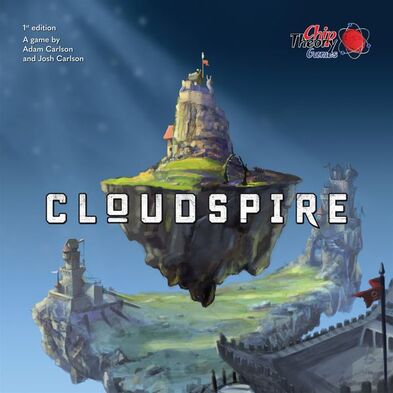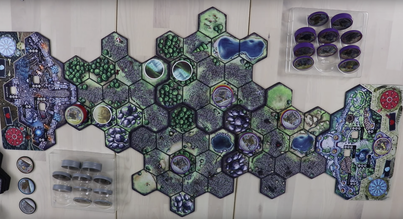 Full disclosure: Chip Theory Games sent me a review copy of Cloudspire. What is this game about? Cloudspire, the latest release from Chip Theory Games, is one of the more unique games in my collection. It is a tower defense/MOBA mashup brought to the tabletop, and I've never played anything else quite like it. As is typical for a Chip Theory release, Cloudspire is all about neoprene and hefty poker chips. But this time, we aren't just talking a nice neoprene playmat. Cloudspire's board is a bit different every time, can be adjusted mid-game, and is entirely made out of neoprene pieces that can be fit together in various ways. At each end of the play area is a player's fortress, and the object of the game is to either destroy the enemy fortress or, if more than one player is in fighting shape at the end of the game, to have the strongest fortress still standing. Play takes place in a series of waves, so Cloudspire does have a built-in timer. You'll also be able to choose one of four (five with an expansion) factions that have different strengths and that play quite differently from each other. Each player's army is made up of multiple fighters and structures that can be deployed. All of them will require "source," a precious in-game currency that you can earn as you play, so you'll need to budget carefully. "Spires," after which Cloudspire is named, are defense towers that automatically attack enemy units that come into range. "Minions" are soldiers from your chosen faction that move automatically towards the enemy tower. Once they are sent out into the world, they cannot be called back, and you can only hinder their movement by cleverly blocking them. Finally, you'll have heroes, your most powerful fighters whose movements and attacks you directly control. By strategically choosing the right minions at the right time, choosing good spots for spires, and using the powers and limitations of each type of unit, you can give yourself the best possible chance at success. You'll also be able to purchase upgrades for your fortress and your forces over time, which gives you an extra layer of strategic decisions. How does it play solo? Cloudspire is generally meant to be a competitive game for 2–4 players, but it does come with a solo mode. In fact, it comes with an entire book of solo scenarios that are meant to be played in order and that are designed to help you master the play style of each faction in the game. There is also an endless mode for solo if you just want to fight wave after wave of enemies. And if you'd rather work in tandem with another player (or play two-handed), there is a book of cooperative scenarios—although I won't be commenting on those, because I have not played them yet.  Look at all that sprawling neoprene... Look at all that sprawling neoprene... Overall Thoughts I mostly adore Cloudspire, but I also have some issues with it that leave me frustrated. I will start by saying that I love the choices involved—I have spent many happy hours deciding how to spend my source, what to buy from the market, what upgrades to add to my spires, and what units to deploy. On top of that, you get to choose how to deploy units. Do you send your minions out separately so they can unleash more attacks? Or do you send them out "stacked," so that one minion acts as a meat shield for others and helps you advance further up the path to an enemy fortress? The array of options is impressive, and I love trying them in different combinations and feeling like I am slowly mastering each faction in the game. There's something very satisfying about being able to consider several options and make what you think are clever decisions about what to do. It is not, however, easy to get to that point in Cloudspire--this game has a serious learning curve. The overall concept of Cloudspire is simple—get strong, pick soldiers, destroy the enemy fortress, protect your fortress. But there is so much going on within that premise that the game loses a lot of accessibility. I would not, under any circumstances, bring Cloudspire to game night and expect to easily teach it and get it running. Cloudspire is very much about "the little things," and there are tons of abilities to keep track of, rules about which structures can be built when, and other little limitations you need to keep in mind as you play. On top of that, because each faction is so different, each player will have a unique experience of the game that is awesome for me as a solo player, but not something I ever want to deal with as a game teacher. When it comes to solo (I have up to this point neglected the co-op scenarios), I am grateful for the book of solo scenarios and pleased with the puzzles on offer. But I also feel a bit limited by the campaign format. Each scenario within the solo campaign has a specific setup, and there are only so many scenarios for each faction. Unlike Hoplomachus, one of my all-time favorites, you cannot expect to just pick a faction, pick an enemy, and go to town. Solo in Cloudspire is much more on the rails, and I like that less. That said, the decisions that Cloudspire offers you are incredibly addictive, and this is a game I can't stop thinking about. Despite its frustrations, Cloudspire is brushing up against greatness. Solving the puzzle of each solo scenario is good fun—and you will probably get a ton of replay value out of the campaign if you are a perfectionist who wants to hit every objective. It will take a while to get through the solo campaign. I have spent hours playing Cloudspire and I am not done yet. Do I recommend it? Maybe. Cloudspire is a very good game, and it's unlike any gaming experience I have had to date. It rewards multiple plays and it is satisfying to build mastery. At the same time, Cloudspire is very expensive—the base price is $129.95, before shipping. If you are content to pay that price for a solo campaign, it might be good for you. If you have a game group that will be super dedicated to playing this game and learning its intricacies, it might be good for you. This one has its imperfections, but it really is something special. Overall Rating: 4 stars Rating Scale: 5 stars — I love it! 4 stars — I really like it. 3 stars — I like it. 2 stars — It's okay. 1 star — Meh.
6 Comments
Dr D
4/15/2020 12:21:14 am
I agree with your sentiments. Just way too expensive for a board game. After watching some playthroughs, I'm not that impressed. A BGG rating of 8.5 is way too overblown. I wouldn't be surprised if most of those were paid ratings or just click-bait style ratings.
Reply
OdinMyGod
3/2/2022 02:19:59 pm
I agree. I believe there are some other reasons too: older games are getting more difficult to find, even games that are just a few years old. (These days games are often difficult to find even on a publisher's website). Thousands of new people are coming to the hobby every year. In many cases, these are the only games they know. They're giving high scores to bad games because they haven't played better ones. 4/15/2020 01:47:22 am
I wouldn't go that far. Chip Theory makes very interesting games, and they have built a loyal following by being kind and communicative with fans. They are genuinely nice people.
Reply
Fred Fil
1/16/2022 07:44:33 am
Hi Liz!
Reply
Your comment will be posted after it is approved.
Leave a Reply. |
AuthorMy name is Liz Davidson, and I play solo board games. A lot of solo board games... Archives
August 2021
Categories
All
|
 RSS Feed
RSS Feed